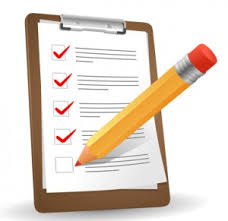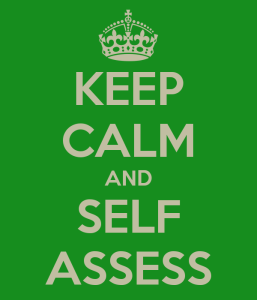Most of you deal with SGOs (Student Growth Outcomes) or SLOs (Student Learning Outcomes) as a way to measure your effectiveness. These are specific performance measures relating to how you do your job. By their nature, they are about one or two specific areas usually focused on your instructional role. Your success as a school librarian depends on a far broader scale. As a model for lifelong learning, make regular self-assessment a habit and discover how it will improve how you are perceived in the educational community.
The fourth strand of the AASL Standards for the 21st-Century Learner is Self-Assessment. The indicators for the fourth standard, “Pursue personal and aesthetic growth” provide guidelines for you to cultivate your own ability to self-assess. Consider the following:
- 4.4.2 Recognize the limits of own personal knowledge.
- 4.4.3 Recognize how to focus efforts in personal learning.
- 4.45 Develop personal criteria for gauging how effectively own ideas are expressed.
- 4.4.6 Evaluate own ability to select resources that are engaging and appropriate for personal interests and needs.
These indicators are excellent for all areas of your life but are particularly apt for assessing where you are in promoting your program, how you are viewed by colleagues and administrators, and in determining where you need to go next. For example, look at 4.4.2. How up-to-date are your tech skills? Do you need to improve them? (See 4.4.3). Expand the concept of personal knowledge to include the skill sets you need to be a leader. I have written many blog posts about leadership. Which of the qualities come naturally to you? Which do you need to develop? How can you do that?
One important element in leadership is communication which is addressed in 4.4.5. Assessing your Emotional Intelligence is key to improving your skill in this area. I will go further into this topic next week, but for now think about whether you are good at perceiving the emotions of others. How good are you at managing your own emotions? You will probably be stronger in some areas of Emotional Intelligence than others, and once you have fully assessed your strengths and weaknesses you can begin to determine how to become more attuned to those around you and communicate more effectively.
 You all want to be valued by the educational community. Some of you are, but others feel their colleagues are unaware of the scope of what they do. You have the power to change that.
You all want to be valued by the educational community. Some of you are, but others feel their colleagues are unaware of the scope of what they do. You have the power to change that.
I recently learned of a school librarian who is doing a very good job, but she doesn’t view herself as a leader. If she self-assessed what she does to have a successful program, she would be more aware of her contributions to the school and see how what she brings is the first step to being a leader. In other words, she is already showing leadership but because she is unaware of it she has not communicated the value of her program to others.
If you are intimidated by the idea of being a leader, you tend to overlook what you already are doing. Don’t think you need to make a giant leap into leadership. You gain confidence and improve you skills by taking small steps. The first is to become self-aware. The AASL Standards for the 21st-Century Learner is not just for students. It is for all learners – and you, too, are a learner. Start self-assessing.

